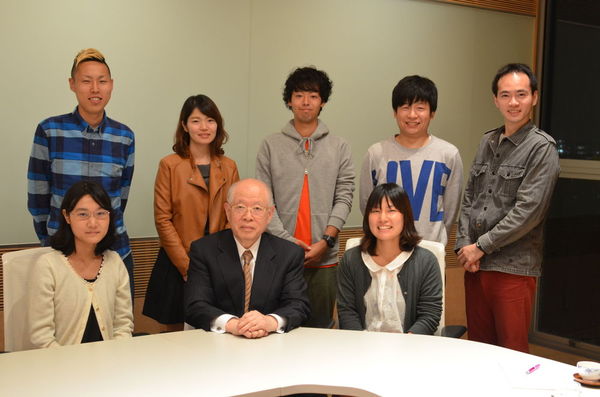University Professor Ryoji Noyori, President of RIKEN and a Nobel Laureate in Chemistry (2001), has contributed numerous articles to "Kamitsubute" in Chunichi Shimbun since January 2013. Based on the articles, he holds regular academic talks with students at Nagoya University. At the Tenth Noyori Academy Salon, held on October 20, 2014, Prof. Noyori and six students from different backgrounds openly discussed the topic of "Developing Creativity." Prof. Noyori explained in the "Kamitsubute" that startling discoveries may not simply be a result of an accumulation of logic, but may emerge from other fields of study. He also claimed that fundamental ability must be cultivated in advance.

Misato Inoue, a junior at the School of Literature
What do you mean by fundamental ability?
Prof. Noyori
Fundamental ability is the ability to receive everything. We must recognize what the truth is. Literature, arts, and science - all of the disciplines are important for human beings to live in a state of continuous advancement.
Te Ma, a second-year student at the Graduate School of Bioagricultural Sciences
Japan has an intellectual culture. I propose that Japanese people should think about combining literature and intellectual culture. By doing so, the appeal of the Japanese to foreign countries would be impressive; thus, the future would be delightful.
Prof. Noyori
There is no future in simply researching only the past and what people have written. Literature can also be used for various purposes in our society. If writing up with emotions, we can only produce a piece of work. The significant thing is how to contribute to society. Culture is extremely important for living in a beneficial life.
Manami Muraki, a senior at the School of Science
How much creativity for the startling discovery do we require to win the Nobel Prize? I've been trying hard, and making many mistakes in the laboratory.
Prof. Noyori
Ideas are necessary for innovation to do what we have not done. To solve problems, we need to meet an unusual event. Both emotions and intelligence are essential along with the use of technology. By assembling all these elements, we could discover many new items. Failure is the important starting point. As you ponder upon the reason why something didn't go well, you eventually make a discovery.
Hiroya Oshima, a first-year PhD student at the Graduate School of Science
I have been studying continuously in the laboratory. I wonder how I could develop a creative thought in this hectic situation.
Prof. Noyori
The important thing is to have an inspiration. If you work like a carriage horse, you would miss such an opportunity. A chance arrives in your spare time, which will pave the way for productive work. Once you find your own new interests and a new value, you can change what you have done in the past.
Keiichiro Murai, a senior at the School of Science
I would like to ask you about the moment of inspiration in your research.
Prof. Noyori
It took me six years after my initial inspiration. If this is called success, it should be useful for people. This way of thinking is consistent with my sense of beauty. The most significant achievement that a person can make is to contribute to society. Prof. Isao Akasaki and Prof. Hiroshi Amano, the Nobel Prize laureates in 2014, have done so.
Saeka Unoki, a freshman at the School of Agricultural Sciences
Before beginning my study at university, I was interested in how to produce delicious food and its relevant technology. Now I want to solve the problems of food shortage and scarcity in the world.
Prof. Noyori
Your idea has changed from a microscopic to a macroscopic view. The reverse viewpoint, from a macroscopic to a microscopic, is also important. A top priority issue in the world today is to reduce poverty. Without reducing poverty, we cannot bring peace into the world.
Original article published in Chunichi Shimbun on October 21, 2014.